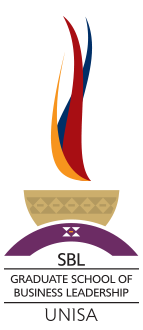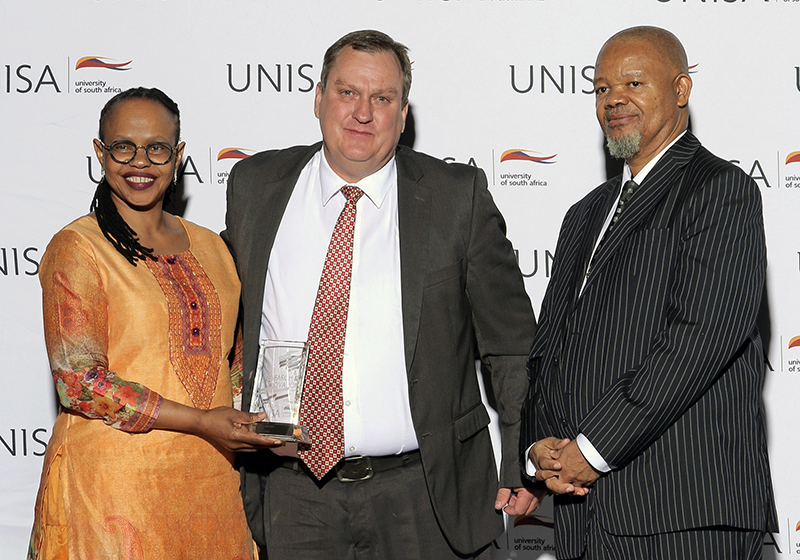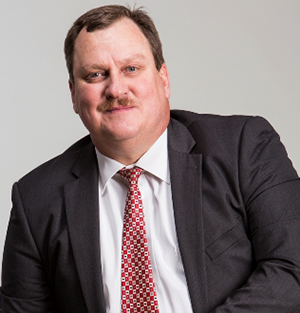

Prof Thenjiwe Meyiwa (VP: Research, Postgraduate Studies, Innovation, and Commercialisation) and Prof Mandla Makhanya (Principal and VC) congratulate Prof Anton Grobler (SBL) (centre) on his 2020 NRF C3 Rating.
“Researchers should respect their uniqueness and investigate the nature of their uniqueness, as it will give them so much satisfaction. For me, it gives me pride to be part of such a diverse country and continent,” says Unisa SBL Professor Anton Grobler, newly rated by the National Research Foundation (NRF) as a C3 researcher.

Prof Anton Grobler (SBL) advises researchers who want to apply for an NRF rating not to get discouraged by the lengthy process.Your application feels like a thesis at some stage, but it is surely worth it.”
Grobler’s research career dates back to the late 80s when he worked for the South African Police Service (SAPS) as an
industrial psychologist. He later joined the higher education sector, initially in an institutional management capacity as the Director of Organisational Development at Unisa, where he was tasked by the Management Committee to conduct various research studies to inform policy and strategy within the institution. In 2013, he was offered a full professorship at the institution’s Graduate School of Business Leadership (SBL), based on his experience, and, specifically, his research record within an organisational context.
Having received his 2020 NRF C3 rating, Grobler says although it was a very long and tedious journey, it is one that he believes academics who are publishing should take. Although his first rating is a C3, he believes that he is well on track to better the rating in the years ahead, as he is building his academic and research career. For him, the rating is necessary for being regarded as an accomplished researcher by his peers, and he is now ready to assist other aspiring researchers on their research journeys.
“My current research focus is mainly to develop models that explain the nature of the relationship between the variables to develop and initiate leadership and organisational behaviour improvement initiatives and interventions. These models are developed based on instruments that have been tested for construct validity through advanced statistical analysis methodology. This has contributed to the discipline within the South African and African contexts through the adoption of an etic approach (since instruments and constructs mainly originated from the United States of America and Europe).”
According to Grobler, it is not uncommon to use foreign developed psychological instruments, or to undertake research using these instruments in South Africa. However, instrument transportability should be substantiated by additional research investigating the psychometric properties of the instrument when used on a South African sample. He is currently busy with the conceptualisation of various leadership styles within the South African context, following an emic approach. Another area that he is working on is sectoral comparisons of leadership, employee behaviour, and human resource practises.
Honoured to be part of the prestigious Global Leadership Organisational Behaviour Effectiveness (GLOBE) study as a Country Co-investigator (CCI) in conjunction with the Young African Leaders Initiative (YALI), Grobler is also involved in collaborative research with the Ethics Institute of South Africa (EthicsSA). The specific focus of this research is on the accurate and valid measurement of an ethical climate or culture and ethical risk assessments with emphasis on ethical leadership and decision making. This registered community engagement research project has yielded publications to date.
Furthermore, this Unisa researcher is the Chief Editor for the African Journal of Employee Relations, previously known as the South African Journal of Labour Relations. The scope of the journal was successfully changed under his editorship.
Grobler advises researchers who want to apply for a rating not to get discouraged by the lengthy process. “Your application feels like a thesis at some stage, but it is surely worth it.”
*By Nancy Legodi, Acting Journalist, Department of Institutional Advancement
Publish date: 2020-06-30 00:00:00.0
Contact the Marketing and Communication office: Ms Thami Kaunda at kaundn@unisa.ac.za
011 652 0339
Telephone: +27 11 652 0248 / +27 11 652 0291
Email: sbl@unisa.ac.za
Physical Address:
Cnr Janadel and Alexandra Avenues
Midrand, 1686
Gauteng, South Africa
Download map & directions (PDF)